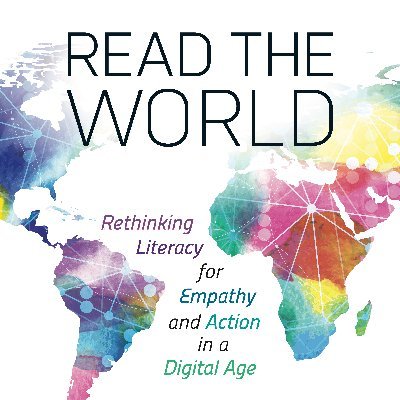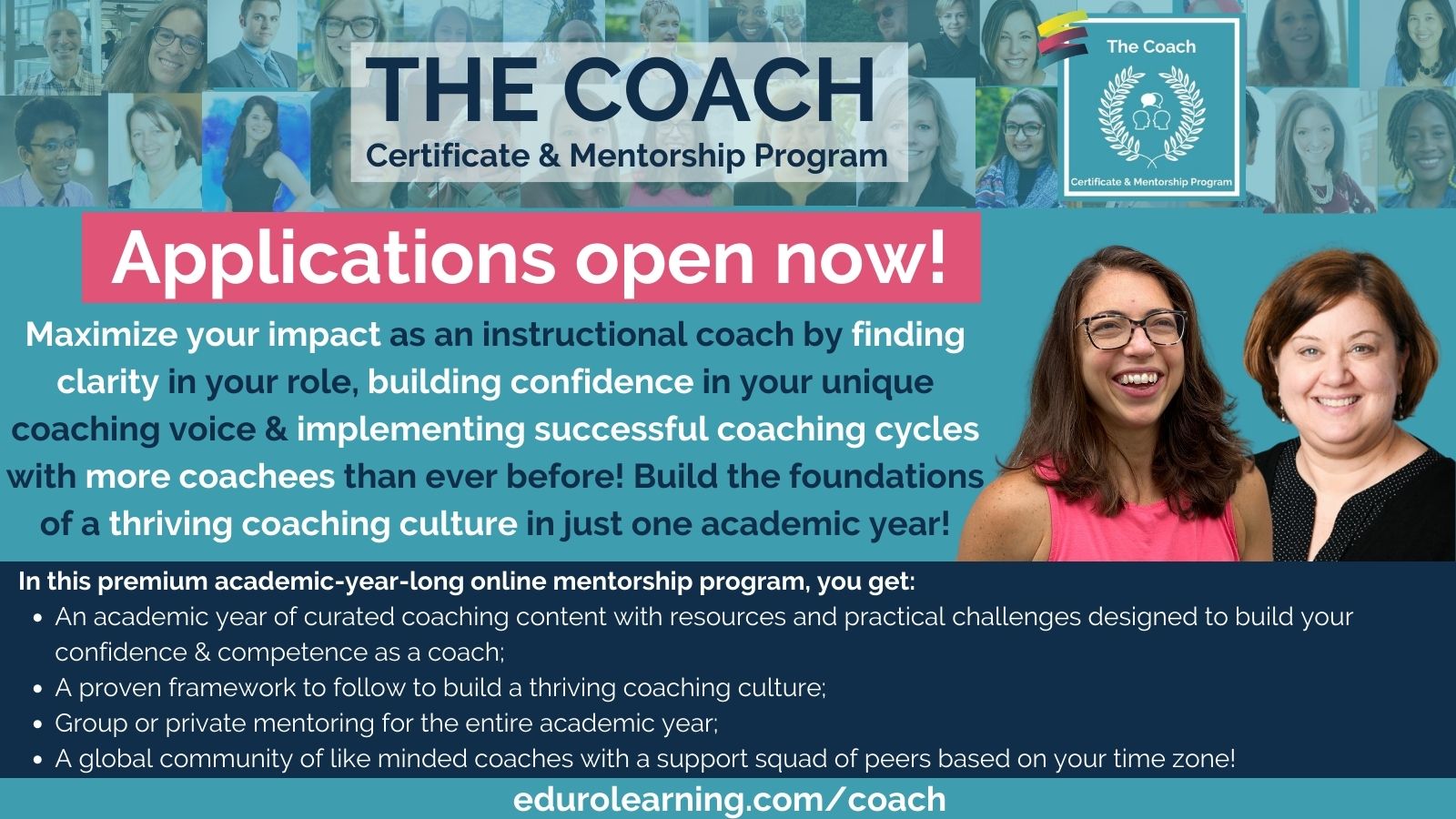In this #coachbetter episode, Kim talks with Kristin Ziemke, a teacher and learning innovation specialist in Chicago. Kristin is passionate about literacy and how we can support students in developing a biliterate brain which can transition seamlessly between traditional and digital literacy skills! They discuss the ways we can use technology tools as “equity machines”, the layering of critical literacy skills including consumption and creation, and building a culture of coaching to empower teachers to take risks with new innovations in learning. For those that are interested in the connections between traditional and digital literacy skills, and want to explore the transferable skills between them, this is the episode for you!
Subscribe to #coachbetter via your favorite Podcast Player!
Featured Guest

Bonus! Watch the Spotlight Version on YouTube!
Show Notes
Author of Read the World: Rethinking Literacy for Empathy and Action in a Digital Age, Amplify: Digital Teaching and Learning in the K-6 Classroom and co-author of Connecting Comprehension and Technology
Teaching and coaching with primarily pre-k – 8 and also high school.
Something you’re excited about in terms of learning / learning innovation. An Intro to you as an education professional
All that we don’t know about digital literacy, looking at the deep structures that we’re not thinking about. Reading varies by format, by devices. The lessons that we need to teach students to multiply because there are so many different ways that we think. Testing and trying new ways to implement those pieces with students.
We rely on how we read to teach students in the same way. Go back to “kid watching” what are they showing you that they need support in.
Mini-lessons for kids – if we support and teach things that kids are showing us, we’re helping them develop a biliterate brain – to go back and forth between both.
Get started by teaching skills in multiple formats – switch by different days.
Sketchnoting. Draw & write your thinking.
Digital provides a lot more opportunity to expand and share and go back to.
Like origami, folding in layering new skills
Living a curious life is the best model you can have for students
What are you relentlessly pursuing as a learner?
What we believe about literacy.
Asking the question: But why?
So long digital learning has been about creating, but I now see the benefit of critical consumption. If we focus only on creating, we’re missing the consumer aspect. Kids need to consume so that they know what a good media project looks like, how do you know what’s true research? Using Mentor Tech.
How can this device become an equity machine? A portal to give everyone a voice and take action. Can also use this to teach listening.
It’s important to be interdisciplinary. You need all these skills to understand various subject areas. Part of it is being aware, so we can build pathways. Finding those natural links so we can name it. “Science is all about close ups”
Many classrooms teach text features, do we teach digital features?
Willingness to be a learner – we often keep going without enough reflection time. Can we ask ourselves: But why, do we do that?
What’s YOUR level of coaching mastery?
All coaches go through various stages of coaching mastery. Once you identify where you’re at, you can begin to build the skills needed to move to the next stage.
This quiz is based on real-life case studies compiled from years of working with coaches inside The Coach Certificate & Mentorship Program!
When you receive your results, you’ll also get your matching case study from the STRIVE Case Studies to see where you fit in the stages of coaching mastery.
Ready to tackle your challenges and move on to the next level in YOUR coaching practice?

The STRIVE Model of Coaching Mastery quiz will help you identify your level of coaching mastery by matching you with case studies compiled from years of working with coaches inside The Coach Certificate & Mentorship Program so you can easily see where you fit!
When you complete the quiz, you’ll get:
- Your matching case study,
- Specific strengths & challenges aligned to your result;
- Suggested next steps for each stage;
Plus the Case Study Document includes:
- Case studies leveled by coaching mastery;
- A framework to identify essential stages of professional growth & key areas to focus on in your professional learning;
- Alignment with the THRIVE Model for a Successful Coaching Culture;
- Space for you to reflect & prioritize so you can take action immediately!
You’ll go straight to the Quiz, and get the Case Study Document via email.
Show Notes continued…
What are your (or your school’s) current goals? How is coaching going to help you get there?
Next steps in literacy development. Professional learning communities. News and literacy cohort. Lots happening at the school level. Broad topic or idea for PD, leads to follow up coaching cycles about what teachers want to try.
Really focusing on listening. Where are people, what do they need. Differentiating for educators, like we do for kids. Everyone is on the continuum, we’re all at different spots.
Being the cheerleader. When you have conversations and make the story public people are more willing to try. The power of sharing is inspiring.
Trying to create a place where everyone teaches everyone and the coach is just that scaffold and cheerleader helping people move forward.
Building a culture like this begins with time. Time with the community to let them know your purpose, it’s not evaluative. Whats your problem of practice, and how can I help you fix it. How can I be a think partner. Comes from building leadership too. If we can make time for this coaching to happen – 20m during a 1 hour weekly staff meeting, share a new topic or showcase what people have done since last coaching cycle. Allowing planning time during the school day or before or after school prep. Organized and planned for time that flows in repetition. The best leaders I’ve had have always valued this learning time and made explicit time for educators to have a 20-30m chunk in lieu of another meeting.
Even providing opportunities at varied time – lunch break, for example. Very focused, choice sessions, giving up 20m of lunch to create a community piece.
Please share a reading / resource you have explored recently that you think would be valuable to other teachers or coaches
Reader, Come Home by Maryanne Wolf (the biliterate brain)
Power of Reading Frank Furedi (throughout history we’ve approached new innovations from a medical perspective. Every new thing we have resistance to at first until we internalize it as a community. We need to find a balance in our minds)
This Book is Anti-Racist by Tiffany Jewell
Where to Begin: A Small Book about Your Power to Create Big Change by Cleo Wade
Reading about things that don’t pertain to education are giving me lots of ideas when I look through a pedagogical lens. This is where my innovative thoughts come from.
Level Up Your Coaching with The Coach!
If you are ready to dive deep into your coaching practice, to help you #coachbetter and build a thriving coaching culture in your school, please join us for our next cohort of The Coach!
Wherever you are in building a coaching culture in your school, The Coach will give you the strategies, skills and tools you need to make coaching a success and will empower you to confidently apply instructional coaching strategies in any situation – from building a coaching program, to having coaching conversations, to being a leader in your school community. We facilitate only one cohort each academic year so we can offer individualized support for each participant.
Coaches of all levels are welcome: you’ll start the program with a self-assessment to determine exactly what the next steps are for you!






Recent Comments